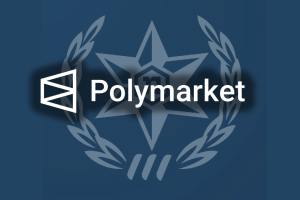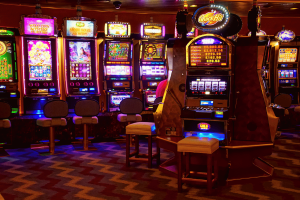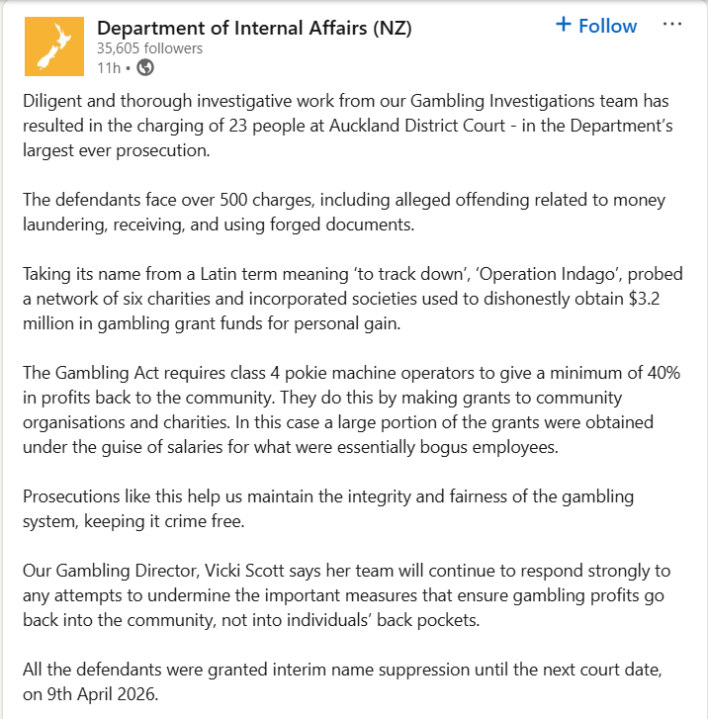ReadWriteWeb

Federal prosecutors say a 31-year-old Jamaican citizen is now facing serious charges in Connecticut over what they describe as a yearslong sweepstakes scam that drained millions of dollars from older Americans.
Court documents unsealed in New Haven lay out allegations that Richard Murray and several others operated the scheme beginning as early as 2018. Investigators say victims were contacted by phone and told they had won a Publishers Clearing House sweepstakes. However, authorities allege that before collecting any supposed prize money, the winners first had to send in fees and taxes.
According to prosecutors, those calls were only the beginning.
After the initial conversations, the group allegedly mailed forged documents to their targets. The papers were designed to look like official winning notifications from Publishers Clearing House, along with tax forms that appeared to come from the Internal Revenue Service. Investigators say the paperwork was meant to make the story believable and reassure victims that the payments were legitimate.
Many of the people targeted were elderly. Prosecutors say victims mailed cash, checks, or money orders to addresses in Connecticut and other states. In some cases, individuals sent multiple payments after being told additional fees were required.
The indictment describes what authorities call a network of "money mules." These were people who received funds from victims and then transferred the money to Murray and others, according to prosecutors. Some of those individuals were allegedly misled themselves and believed they were taking part in lawful business transactions.
Federal officials also claim the group recruited others to open bank accounts under different names to move the money. Investigators say some of those accounts were tied to ATM cards used in Jamaica, where cash withdrawals were made from funds generated by the scheme.
A federal grand jury in New Haven returned an indictment on April 16, 2024. Murray is charged with one count of conspiracy to commit mail fraud and wire fraud, three counts of mail fraud, and one count of conspiracy to commit money laundering. Each charge carries a maximum possible sentence of 20 years in prison.
Authorities arrested Murray in Hampton, Georgia, on January 22, 2026. He later appeared before U.S. Magistrate Judge Robert M. Spector in New Haven on Wednesday (February 11), where he pleaded not guilty to all charges. He has remained in custody since his arrest.
Prosecutors stress that an indictment is only an allegation. Murray is presumed innocent unless and until he is proven guilty in court.
Anyone who believes they may have been targeted is encouraged to report the incident to federal authorities.
Featured image: Canva
The post Jamaican man faces federal charges in sweepstakes elder fraud case in Connecticut appeared first on ReadWrite.

A 24-year-old man with ties to Wolcott, Connecticut, is facing federal charges after prosecutors say he ran a crypto investment scam and funneled nearly $1 million of victims' Bitcoin into online bets on the offshore gambling site Stake.com.
A grand jury in New Haven returned the 21-count indictment on January 20, and authorities unsealed it this week. Federal prosecutors allege that Elmin Redzepagic promoted himself as a skilled digital asset trader and persuaded people to send him Bitcoin with promises of strong, steady returns.
Investigators say the sales pitch centered on easy profits. Victims were told their cryptocurrency had grown in value and was ready to be withdrawn. But when they tried to cash out, Redzepagic allegedly said they first had to pay "gas fees" or other charges. In some cases, he claimed he worked with a crypto trading group led by someone known only as "The Chef," who supposedly decided when payouts would be released.
How the alleged Wolcott crypto scheme involving Stake.com unfolded
Court records paint a different picture of where the money went. Rather than placing investors' Bitcoin into legitimate trades, prosecutors say Redzepagic transferred the funds to accounts on Stake.com, an offshore online gambling platform. Authorities allege that he used the money there to place bets.
By the time the activity ended, investigators estimated the gambling resulted in a net loss of about $950,000 across multiple victims.
The indictment charges Redzepagic with seven counts of wire fraud and 11 counts of international money laundering. He also faces three counts of making false statements to agents with the Internal Revenue Service's Criminal Investigation Division.
If convicted, each wire fraud and money laundering count carries a potential sentence of up to 20 years in prison. The false statement charges are each punishable by up to five years.
Redzepagic, who recently lived in Florida, appeared Thursday in federal court in Hartford. He pleaded not guilty to all counts. After the hearing, he was released on a $500,000 bond as the case proceeds. Magistrate Judge Thomas O. Farris presided.
According to a publicly available roster biography from Southern Connecticut State University, Redzepagic previously played men's basketball for the school and has ties to Wolcott.
Federal officials pointed out that an indictment is not evidence of guilt. Under U.S. law, a defendant is presumed innocent unless prosecutors prove guilt beyond a reasonable doubt.
Authorities say the alleged fraud spanned from about May 2021 through March 2025. During that stretch, victims were directed to send Bitcoin to digital wallet addresses that investigators say Redzepagic controlled.
The IRS Criminal Investigation Division is leading the investigation, and Assistant U.S. Attorney Susan Wines is prosecuting the case.
Featured image: Canva
The post Wolcott man indicted in alleged crypto fraud tied to $950K of Stake.com gambling losses appeared first on ReadWrite.

Israeli authorities have charged a military reservist and a civilian with using secret army information to place bets on the online prediction platform Polymarket, a case that has set off alarm bells inside the country's defense establishment.
The indictments follow a joint probe carried out by the Defense Ministry, the Shin Bet security agency and the Israel Police. Investigators detained several people, among them reservists who had access to classified operational details during their service. Officials suspect some of that sensitive information was then used to make wagers tied to military activity.
Prosecutors have now filed charges against one reservist and one civilian in the Tel Aviv District Court. The offenses are described as "severe security offences," along with bribery and obstruction of justice. Both defendants remain behind bars as the case moves forward. A court-imposed gag order is in place, limiting what can be publicly disclosed about the investigation.
In a statement approved for release, the investigative agencies warned that the alleged conduct created a tangible threat to Israel Defense Forces operations and to national security more broadly. Authorities said they regard the accusations with "utmost severity" and pledged to act decisively against any unlawful use of classified material.
How the Israeli reservist was allegedly found using Polymarket
Polymarket, based in the United States, allows users to trade on the likelihood of real-world events, including political and geopolitical developments. According to local media reports, suspicions arose that confidential military information may have been used to guide bets related to the timing or possibility of military action.
Security officials emphasize that engaging in such betting, relying on secret and classified information, poses a real security risk to IDF operations and to state security.
Israeli Police
While the precise nature of the wagers has not been made public, officials believe the trades were linked in some way to operational decisions or anticipated developments. Using inside knowledge of that kind, if proven, would not only breach military secrecy rules but could also compromise operational security.
Because of the publication ban, the names of the accused and additional details about the alleged activity have not been released. Defense officials have stressed that exploiting classified information for personal financial gain strikes at the heart of the military's trust system and could undermine state interests.
Authorities have not indicated that any specific operation was harmed as a result of the alleged betting. Still, they have characterized the case as a serious ethical and security lapse.
ReadWrite has reached out to Polymarket for comment.
Featured image: Israeli Police via press release / Polymarket
The post Israeli reservist civilian charged over classified Polymarket betting scheme appeared first on ReadWrite.

MyPrize is bringing another recognizable name into its lineup of celebrity talent. The Miami-based social gaming and entertainment company announced Thursday that actor and comedian Marlon Wayans has signed on as a Premier Creator.
Under the deal, Wayans will produce original content for the platform, appearing in livestreams, hosting interactive sessions and launching his own multiplayer Play Together room. His addition comes shortly after NBA star James Harden joined the company as its first Premier Creator, signaling a broader push to mix star power with online play.
Best known for his long career as an actor, writer and producer, Wayans plans to use the platform to meet fans in a more direct way. During his live sessions, users will be able to play games alongside him and chat in real time. Company leaders say the aim is to shrink the distance that typically separates celebrities from their audiences and make the experience feel more personal.
"Bringing Marlon Wayans into the MyPrize creator ecosystem is a massive moment for our platform," said Zach Bruch, founder and CEO of MyPrize, in a press release. "Marlon is a comedy icon, a multi-faceted entertainer, and a cultural pillar across decades whose creativity and charisma have shaped generations. With Marlon joining MyPrize, we're offering his fans spanning generations a place to play, connect, and hysterically laugh together in a way that is authentic, unfiltered, and fundamentally social."
Expanding the creator-driven entertainment model
MyPrize says its user base has climbed past 1.2 million people worldwide. The company also reports that players have won more than $1 billion in prizes across the platform. It blends multiplayer gaming, livestreams, creator-led programming and interactive markets into what it pitches as a single digital hub for entertainment.
For Wayans, the draw centers on culture and connection.
"I'm excited about MyPrize because they focus on culture and make it possible for me to connect with my fans directly in a way that wasn't possible before," said Wayans. "I can't wait to jump on MyPrize and play games, joke around, and hang out with my fans around the world. MyPrize offers the future for how fans, actors, creators, and comedians will connect and cultivate all-new relationships together."
The platform operates as a free-to-play social gaming and social markets service built around live, shared experiences. Instead of simply watching a stream, users can team up with creators, streamers and friends in multiplayer games and events designed to spark conversation and interaction.
The company also points to its proprietary AI personalization engine, which it says tailors recommendations and experiences across gaming, streaming and social markets.
Executives say the collaborations are key to blending pop culture, community and technology into one space where fans are invited to log in and take part.
Featured image: MyPrize
The post Marlon Wayans joins MyPrize as Premier Creator in entertainment platform expansion appeared first on ReadWrite.

More than 20 people have been charged after it was discovered that a network of organizations has obtained NZD 3.2 million ($1.9 million) in fraudulent gambling grant funds.
The network included six charities and incorporated societies, found to have fraudulently gained $3.2 million in gambling grant funds. 23 people were charged in the Auckland District Court on Thursday (February 12), with more than 500 charges levelled against them in total under the Crimes Act, including multiple alleged counts related to money laundering, receiving, and using forged documents.
It’s been described as the region’s “largest ever prosecution” by the Department of Internal Affairs gambling director Vicki Scott, coming after a far-reaching investigation. Under the Gambling Act, gambling machine operators are required to give a minimum of 40% of their profits back to the community via grants to community groups and charities.

However, these groups obtained the grants for salaries for employees that didn’t exist.
"Taking its name from a Latin term meaning 'to track down', 'Operation Indago', probed a network of six charities and incorporated societies used to obtain $3.2 million of gambling grant funds for personal gain. It's been a mammoth and complex investigation," said Scott in a press release.
Gambling grant funds used to launder money through gaming venues
Some of the defendants also allegedly ran gambling venues using these poker machines, laundering the grant funds through the venue’s bank accounts to repay gambling machine profits back to the operators in what Scott describes as a “cynical abuse of the gambling system”.
“We will continue to respond strongly to any attempts to undermine the important measures that ensure gambling profits go back into the community, not into individuals' back pockets,” Scott said.
All of the defendants’ identities are being kept anonymous until their next court date on April 9. In Auckland, money laundering and related offences have a maximum penalty of seven years’ imprisonment, while using a forged document has a maximum penalty of 10 years in prison. Similar schemes have taken place elsewhere around the world, including the US and the UK.
Featured image: Unsplash
The post 23 charged after charity network allegedly siphoned $3.2 million gambling grants appeared first on ReadWrite.
